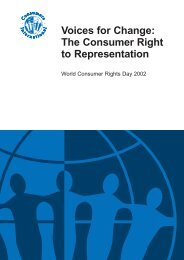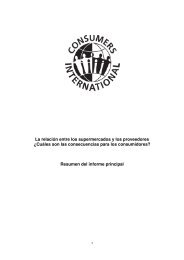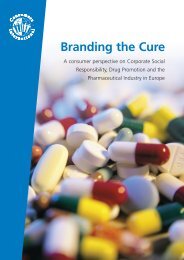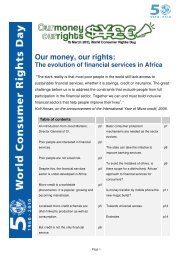The remittances game of chance: playing with loaded dice? January ...
The remittances game of chance: playing with loaded dice? January ...
The remittances game of chance: playing with loaded dice? January ...
You also want an ePaper? Increase the reach of your titles
YUMPU automatically turns print PDFs into web optimized ePapers that Google loves.
Francophone Africa, Western Union has a 65-100% share <strong>of</strong> the market. 50 In 2007, it was estimated<br />
that in the US Nigerian corridor, Western Union controlled 80% <strong>of</strong> transfers through banks into Nigeria<br />
and 78% <strong>of</strong> transfers through banks out <strong>of</strong> Nigeria. 51<br />
Furthermore, it is reasonable to suppose that the market shares <strong>of</strong> these leading MTCs have been<br />
rising in recent years, regionally as well as globally, as a result <strong>of</strong> market acquisitions and<br />
consolidations.<br />
Western Union, for example, purchased a leading Italian money-transfer network, Angelo Costa, in<br />
April 2011, as well as acquiring Finint, a leading EU money transfer network, in October 2011. 52<br />
Western Union already owns the brands Vigo, Orlandi Valuta and Pago Facil, which operate primarily<br />
in the US/Latin American corridors.<br />
Similarly, MoneyGram acquired MoneyCard World Express and Cambios Sol in 2008, which it refers<br />
to in its annual report as “two Spanish super money transfer agents”. In 2010, MoneyGram also<br />
acquired Dutch agent Blue Dolphin Financial Services.<br />
Reading the annual US Securities and Exchange Commission reports <strong>of</strong> the two <strong>remittances</strong><br />
behemoths over a period <strong>of</strong> five years, there seems to have been at least one annual acquisition per<br />
MTC. It would be interesting to determine to what extent competition authorities have considered the<br />
above-mentioned acquisitions a priori and ex ante to analyse the impact on competition in the<br />
<strong>remittances</strong> markets in their countries and globally.<br />
Interestingly, some MTCs themselves perceive there are competition problems in the marketplace. In<br />
a survey <strong>of</strong> 73 remittance providers in six US states, 13.85% responded that the market was<br />
oligopolistic and 18.46% stated that the market was in fact consolidating, though some 50% did<br />
perceive that competition was on the rise. 53 This perception could indicate that, on a US state-by-state<br />
basis, new competitors are entering the market, but on the industry-wide scale, there remain the<br />
dominant MTCs. <strong>The</strong> same survey also indicated that US remittance providers feel oppressed by<br />
‘know-your-client’ account opening rules, licensing and bonding requirements, which do not impact<br />
the informal competition. 54 Further, current operators see building huge networks <strong>of</strong> agents and<br />
investing in compliance systems as an almost insurmountable barrier to entry in the remittance<br />
business. 55<br />
• Limited involvement from mainstream banks<br />
Recently, banks, particularly in the US, have become more important players in the <strong>remittances</strong><br />
marketplace but they appear to be a less popular choice due to the fact that many senders, and even<br />
more recipients, lack bank accounts (immigrants tend to view banks as costly due to account fees,<br />
and are put <strong>of</strong>f opening accounts by the perception that they do not make enough money). Further,<br />
banks have “banking hours,” which may make a midday visit to one’s bank inconvenient for a day<br />
labourer. Additionally, in quite a few jurisdictions, banks require pro<strong>of</strong> <strong>of</strong> residency to open an<br />
account, which may be difficult as well as bureaucratic for immigrants to demonstrate. 56 Italian banks,<br />
for example, require a valid immigration status in the country (a permesso di soggiorno or carta di<br />
soggiorno) as well as <strong>of</strong>ficial residency in the town in which you are opening a bank account. Both<br />
documents can take many months to process. 57<br />
Further, commercial banks do not have the wide disbursement reach that MTCs do, and are <strong>of</strong>ten not<br />
present in rural areas. For example, Western Union has 445,000 agents in 200 countries 58 and<br />
MoneyGram 233,000 locations in 191 countries (which in the case <strong>of</strong> MoneyGram is more than twice<br />
the number <strong>of</strong> locations <strong>of</strong> McDonald’s, Starbucks, Subway and Walmart combined). 59 In contrast,<br />
Wells Fargo Bank has just 27,000 payout locations in a mere 15 countries. 60<br />
Further, while a network <strong>of</strong> ATMs in rural areas could be effective distribution ‘agents’ for banks, they<br />
require frequent maintenance and are prone to vandalism. 61 And as already mentioned, migrants<br />
<strong>of</strong>ten prefer a more high-touch customer service approach.<br />
On the other hand, some <strong>of</strong> the established commercial banks are making a valiant attempt to<br />
compete <strong>with</strong> the MTCs for market share. In the US, Wells Fargo and Bank <strong>of</strong> America appear to<br />
12







![pkef]Qmf eg]sf] s] xf] < - Consumers International](https://img.yumpu.com/6479658/1/184x260/pkefqmf-egsf-s-xf-consumers-international.jpg?quality=85)